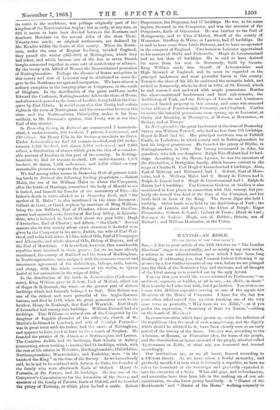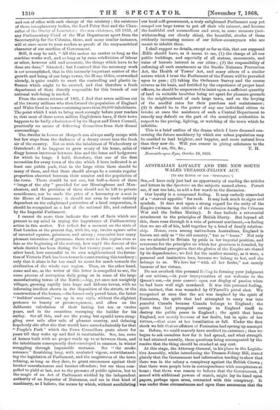11rANTED—AN ./ED1LE.
[TO THE EDITOR OF THE "SPECTATOR]
Sin,—A line in your article of the 24th October on "The London Elections" suggests so naturally, and so nearly in my own words, a reform in our administration upon which I have been long thinking of addressing you, that I cannot forbear following it up at once by a few further remarks of my own, before we are plunged into the thick of the November fogs and elections, and all thought of the Ideal among us is crowded out by the ugly Actual.
You say that you would like to see returned to Parliament "an architect, engineer, or builder, or all in one,—an iEdile, in short." Most heartily do I echo that wish, but I go further. You wish to see a man with .Edilian capacities serving as one of the mystic 658 Members of the House of Commons. I have for the last few years often asked myself this que.stion (making use of the very saute term as yourself), " 1VIly have we no dEdile,"—or if you prefer the expression, " Secretary of State for Towns,"—sitting on the bench of AlinWers?
In commonwealths which have grown up under the influence of the republican idea the need of such a magistracy, and the dignity which should be allotted to it, have been clearly seen at an early period of the history of the State. The city was, according to the Athenian, or Roman, or Florentine idea, the home of the people, and the chamberlain or house steward of the people, whether called Agoranomos, or ./E.1ile, or what not, was honoured and trusted accordingly.
Our institutions are, as we all know, framed according to a different theory. As we have taken a feudal monarchy, and gradually moulded it into what is virtually a republic, so have we taken the household of time Sovereign and gradually expanded it iuto the executive of a State. What odd gaps, and redundancies, and anomalies have thus been left in the making up of our ad- ministration, we also know pretty familiarly. A "Master of the Duckhounds" and "Master of the Horse" walking solemnly in and out of office with each change of the ministry ; the existence of those interplanetary bodies, the Lord Privy Seal and the Chan-
cellor of the Duchy of Lancaster ; the non-existence, till 1853, of any Parliamentary Chief of the War Department apart from the Secretaryship for the Colonies, these, and many similar instances, will at once occur to your readers as proofs of the unsymmetrical character of our machine of Government.
Still, it may be said, "All this makes no matter so long as the machine works well, and so long as by some subdivision of labour or other, however odd and eccentric, the things which have to be
done are done." Granted ; but I contend that the necessary work is not accomplished, that in this intensely important matter of the growth and being of our large towns, the Home Office, overworked
already, is quite unable to exert the controlling and plastic in- fluence which ought to be exerted, and that therefore a fresh department of State directly responsible for this branch of our national well-being is needed.
From the census returns of 1861, I find that seven millions out of the twenty millions who then formed the population of England and Wales lived in towns containing more than 30,000 inhabitants. The point which I wish to bring most strongly before your readers is, that most of these seven million Englishmen have, if their town happens to be badly administered by its Mayor and Town Council, practically no means of delivering themselves from their dismal surroundings.
The dweller in Lewes or Morpeth can always easily escape with but few steps from the darkness of a dreary street into the fresh air of the country. Not so with the inhabitant of Wednesbary or Gateshead ; if he happens to grow weary of his home, miles of dingy houses intervene between him and the lanes and hedgerows for which he longs. I hold, therefore, that one of the first necessities for every town of the size which I have indicated is at least one public park, that in the large cities there should be many of them, and that there should always be a certain regular proportion observed between their number and the population of the town. There should be not one, but half-a-dozen of these "lungs of the city" provided for our Birminghams and Man- cheaters, and the provision of them should not be left to private munificence, nor be made the price of a baronetcy or a seat in the House of Commons ; it should not even be made entirely dependent on the enlightened patriotism of a local corporation, it should be recognized as a law of the national life, and enforced by the Imperial Parliament.
I cannot do more than indicate the sort of facts which are present to my mind in urging the importance of Parliamentary action in this matter. Yet reflect for a moment on the state of East London at the present day, with its, say, twelve square miles of unvaried squalor, griminess, and misery ; remember how many pleasant interstices of greenness there were in this region even as late as the beginning of the century, how rapid the descent of the whole district has been during the last twenty years ; and, on the other hand, how successful in its own neighbourhood the forma- tion of Victoria Park has been towards counteracting this tendency ; only that it alone is far too small to count for much towards the civilization of the whole vast region. Then, on the other hand, come and see, as the writer of this letter is compelled to see, the same process of corruption daily going on in some of the large manufacturing towns of the North ;—big, yet once not unsightly villages, growing rapidly into huge and hideous towns, with no informing intellect shown in the disposition of the streets, or the construction of the houses,—the former only paved lanes, the latter "builders' erections," run up in any style, without the slightest pretence to beauty or picturesqueness, and often on the deliberate calculation of their lasting but ten or twelve years, and in the meantime recouping the builder for his outlay. See all this, and see the young but squalid town strag- gling over mile after mile of pleasant country, and defacing hopelessly site after site that would have served admirably for that "People's Park" which the Town Councillors prate about for years till they wake up and find it unattainable. See, too, rows of houses built with no proper roads up to or between them, and the inhabitants consequently dust-enveloped in summer, in winter struggling through impassable morasses. See "the smoke nuisance" flourishing long, with unabated vigour, notwithstand- ing the legislation of Parliament, and the magistrates of the town refusing, as long as they dare, to grant summonses against their brother manufacturers and brother offenders ; but see them com- pelled to yield at last, not to the pressure of public opinion, but to the magic of an Act of Parliament wielded by the independent authority of an Inspector of Nuisances, and see in that kind of machinery, as I believe, the means by which, without annihilating our local self-government, a truly enlightened Parliament may yet compel our large towns to put off their vile raiment, and become the healthful and commodious and even, in some measure (not- withstanding our cloudy skies), the beautiful, abodes of those evidently increasing masses of our fellow-countrymen who are meant to inhabit them.
I shall suggest no details, except so far as this, that our supposed 2Edile should have, as it seems to me, (1) the charge of all our public buildings, and especially of all statues, monuments, and ruins of historic interest in our cities ; (2) the responsibility of enforcing all such enactments as the Smoke Nuisance Prevention Act, the Health of Towns' Act, and many others of a similar nature which I trust the Parliament of the Future will be prevailed upon to pass ; (3) taking the Ordnance Survey and the census returns as his basis, and fortified by the experience of proper local officers, he should be empowered to insist upon a sufficient quantity of land in suitable localities being set apart for pleasure-grounds in the neighbourhood of each large town, and on the levying of the needful rates for their purchase and maintenance ; (4) it should be in the power of any one individual citizen to invoke at once the assistance of such a Central Department to remedy any default on the part of the municipal authorities in respect to the paving, lighting, or watching of the town which he inhabits.
This is a brief outline of the dream which I have dreamed con- cerning the future machinery by which our urban population may be enabled to lead brighter, and happier, and more natural lives than they now do. Will you concur in giving substance to the































 Previous page
Previous page